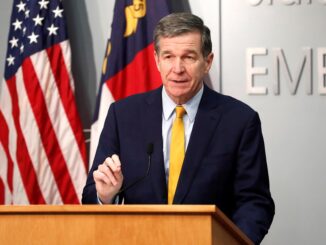
RALEIGH —Democratic Gov. Roy Cooper vetoed two more bills on Aug. 24, bringing his overall veto total for his two terms in office to 91. The four governors preceding Cooper who had veto power only vetoed 35 bills combined.
The two bills vetoed by the governor this time around were Senate Bill 512, Greater Accountability for Boards/Commissions, and Senate Bill 747, Election Law Changes.
Cooper’s veto message of Senate Bill 512 claims the measure will “hurt the effective and efficient use of taxpayer money by impairing the Governor’s constitutionally required duty to execute the laws passed by the legislature.”
His veto message of the bill claims it “interrupts the critical work of boards and commissions to protect public health, provide clean air and water, recruit new jobs, lower electric bills and more,” and “Fundamentally it violates the separation of powers enshrined in the state Constitution.”
Cooper also called it a “legislative power grab.”
In a statement, Sen. Warren Daniel (R-Burke) refuted Cooper’s veto claims.
“Our state’s boards and commissions are often overlooked, but their regulatory authority has substantial impacts on our lives,” Daniel said. “Gov. Cooper has taken advantage of his appointment power by choosing members with no regard for the diverse makeup of our state.
“The legislature is the elected body closest to the people of North Carolina and has the ability to recruit a qualified, diverse roster of appointees. Senate Bill 512 balances appointment power between the legislative and executive branches and brings better representation to North Carolina’s boards and commissions. I look forward to joining my colleagues in overriding Gov. Cooper’s misguided veto.”
In an April press statement on Senate Bill 512, Senate Leader Phil Berger (R-Eden) said, “Appointing members to our boards and commissions should not be limited to one particular person or administration” and that the legislature “needs to have a seat at the table when it comes to our boards and commissions.”
Senate Bill 512 amends the makeup of and how appointments are made to various boards and commissions. The bill would give some appointments to certain boards or commissions to the legislature that are currently only made by the governor.
The commissions and boards included in the bill are the Utilities Commission, Environmental Management Commission, Commission for Public Health, Board of Transportation, Coastal Resources Commission, Wildlife Resources Commission, N.C. Railroad Board of Directors and the UNC Health Care Board of Directors.
The bill also establishes an Economic Investment Committee with members including the secretary of Commerce, secretary of Revenue, director of the Office of State Budget Management, the speaker of the House or his designee, the president pro tem of the Senate or his designee, and one appointment each by the House speaker and president pro tem of the Senate.
Cooper’s second veto was of Senate Bill 747. In his veto message, he accused Republicans of a power grab and discrimination against certain groups of voters when it came to early and absentee voting. He also accused the bill of “encouraging intimidation at the polls by election deniers and conspiracy believers.”
Under current law, absentee ballots can be received as late as 5 p.m. on the third day after Election Day. Under Senate Bill 747, the deadline is moved to 7:30 p.m. on Election Day regardless of postmark. Military and overseas voters would be the exception to that requirement.
Senate Bill 747 is around 42 pages long and makes several changes to conform with state and federal laws as well as a wide range of election law topics, including closing loopholes in same-day voter registration, removing foreign citizens from voter rolls, and challenges to ballots and registrations, as well as polling place issues, such as polling place judges and rules related to poll observers.
The bill requires the N.C. State Board of Elections to include a bar code or a unique identifier on each container-return envelope for mail-in absentee ballots for tracking purposes. Additionally, one-stop absentee voting would be renamed to “early voting.”
The governor’s official veto was preceded by a video message posted to X, formerly known as Twitter, in which he made similar claims about the bill as his veto message.
“Right now, legislative Republicans in North Carolina are pushing an all-out assault on the right to vote using the advice of Trump’s handpicked election denier Cleta Mitchell, who was on the call trying to help him overturn the election in Georgia,” Cooper said in the video.
The governor also claimed, “If you’re a young person, Republicans really don’t want you to vote,” and “If you’re black or brown. Republicans really don’t want you to vote.”
Through his press account on X, Senate Leader Phil Berger (R-Eden) blasted Cooper’s video message.
“Gov. Cooper is embarrassing himself and his office with this blatant audition tape for the Biden-Harris administration,” Berger’s Press Shop account said. “Instead of lying about the bill and belittling North Carolinians who want to observe what is happening in their polling places, he should work with us to improve election security.”
House Speaker Tim Moore (R-Kings Mountain) also responded to the governor.
“Gov. Cooper is mischaracterizing a bill that simply strengthens election integrity in North Carolina,” Moore said in a statement. “It’s unfortunate that he would rather score political points by crying ‘racism’ than be honest about the balanced, common-sense election reforms passed in the House and Senate.”
Moore also said, “I anticipate the House will swiftly override his veto.”
Some of Cooper’s video statements went as far as to claim Republicans “want to intimidate you by stacking the polling place with Republican ‘poll observers’ who will be watching you vote and can hear your conversations with election officials.”
The governor then went a step further, adding, “Many of them will be election-denying conspiracy believers trying to disrupt the process and prevent certain people from voting.”
Senate Bill 747’s provisions on poll observers consolidate the statutes for those roles and contain no language about “stacking” observers by political party. Poll observers have always been a part of the voting process, and the bill would allow for no more than three at a time from the same political party to be in the voting areas.
The first to respond to Cooper’s video message was Daniel, who focused mainly on the governor’s poll observer claims.
“When North Carolina voters vote, democracy wins. That’s why we are creating a secure election system that makes it easy to vote and protects election integrity,” Daniel said. “But Gov. Cooper wants his handpicked partisans running our elections and he apparently feels threatened by North Carolinians observing what happens in their polling places.
“North Carolina is not a third-world dictatorship, no matter how hard Gov. Cooper tries to make it one. We have an open democracy. By overriding this veto, we’ll guarantee every citizen’s right to vote with confidence in the security of our elections.”
Daniel’s statement also refuted the governor’s complaints about the absentee ballot acceptance deadline moving from three days after the election to election night.
The Burke County lawmaker pointed to the 30 other states that have an acceptance deadline on or before Election Day, per data published by the National Conference of State Legislatures. Daniel also referenced an April 2022 SurveyUSA/WRAL poll showing that 56% of citizens in North Carolina support Election Day as the deadline for mail-in ballots.



